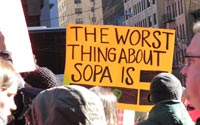Congress Urged To Seek Broad Input On Piracy Laws
- by Wendy Davis @wendyndavis, February 6, 2012
 Amnesty International, Public Knowledge, Internet Archive and Mozilla are among a broad coalition of 70 groups that wrote to Congress asking lawmakers to seek a "fresh
perspective" before attempting to revise the controversial Stop Online Piracy Act and Protect IP Act.
Amnesty International, Public Knowledge, Internet Archive and Mozilla are among a broad coalition of 70 groups that wrote to Congress asking lawmakers to seek a "fresh
perspective" before attempting to revise the controversial Stop Online Piracy Act and Protect IP Act.
"A wide variety of important concerns have been expressed -- including views from technologists, law professors, international human rights groups, venture capitalists, entrepreneurs, and above all, individual Internet users," the groups write. "The concerns are too fundamental and too numerous to be fully addressed through hasty revisions to these bills."
The signatories specifically urge Congress to draw on "accurate and unbiased sources" to determine the economic effects of copyright infringement. "Congress cannot simply accept industry estimates regarding economic and job implications of infringement," the letter states.
They also urge Congress to avoid "a narrow, single-industry" point of view. "Too often, Congress has focused exclusively on areas where some rights holders believe existing law is too weak, without also considering the ways in which existing policies have undermined free speech and innovation," they argue, citing the shutdown of video-sharing platform Veoh.
UMG sued Veoh in 2007 for hosting videos that infringed copyright. Veoh successfully argued at trial, and again on appeal, that it was protected by the Digital Millennium Copyright Act's “safe harbor” provisions and, therefore, wasn't liable for infringement by users. But the victory came too late for the company, which declared bankruptcy in 2010. (Veoh was subsequently absorbed by Qlipso Media Networks, which currently operates the site Veoh.com.
Last month, after widespread protests, Congress agreed to put the brakes on SOPA and the Protect IP Act. The Hollywood-backed bills target “rogue” Web sites that are dedicated to infringement, but critics said the language in the bills was so broad that they could affect numerous sites with user-generated content.
Among other provisions, SOPA and Protect IP provide for court orders banning search engines from returning links to “rogue” sites, and allow courts to prohibit credit card companies and ad networks from doing business with such sites. The measures also originally included provisions requiring Internet service providers to block domains of rogue sites.


